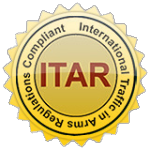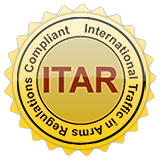
New cooperations which were approved by the United States Congress, favor international defense trade between the US and its allies the United Kingdom and Australia, by establishing an internal market of ”Approved” or “Trusted” defense traders. New treaties signed on September 29, 2010, formed virtually closed cooperations between the US and Australia and separately between the US and the UK. These treaties are now being implemented into the law of the three countries.
In the US, these Treaties will advance the trade of certain defense articles controlled pursuant to the United States International Traffic in Arms Regulations (“ITAR”) (Title III of the Security Cooperation Act of 2010) between the countries.
Currently, the ITAR and the regulatory procedures are very cumbersome and restrictive. These Treaties remove the requirement for individual export licenses and allow for the license-free movement of eligible defense articles, including those that are ITAR-controlled, within the approved Australian, UK and USA communities. These changes, among others, are reflected in changes currently being made to the ITAR.
The Treaties between the United States, the UK and Australia allows these countries to gain a commercial advantage in the global defense market. Local pre-approved defense companies will join the “Approved Communities” or “Trusted Nations” market and will become eligible for free trade movement of defense items. Before such treaties were in place, cross-border defense trading between these countries were complex, to say the least. Even at the initial stages of an export deal, country compliance involves costly and time consuming bureaucratic procedures. Considering that such deals take a long time to mature, the regulatory cost added to the presale phase mount to a significant barrier to all but only the biggest or well financed companies.
It gets more complicated, as companies share technologies and information which may result in the unintentional mixing or deliberate integration of local defense information, forcing companies to deal with multiple regulations of the export regimes of the different countries. These new post-treaty laws, regulations and rules essentially give the US more control over “mixed” technology defense items which are composed of US ITAR controlled defense items in part, transferred under preferred trade status within an approved community of defense players.
Implications for Australia
The Australian Defense Ministry has redrafted the defense laws to incorporate the new treaty. On 2 November 2011, the Australian Minister for Defense Materiel, the Hon Jason Clare MP, introduced the Defense Trade Controls Bill 2011, into the Australian House of Representatives. The purpose of this Bill is to implement the Australia-United States Defense Trade Cooperation Treaty which is meant to strengthen Australia’s export controls for defense and dual-use goods. Mr. Clare stated that the Bill has the potential to improve business opportunities for Australian companies to participate in US contracts. The Minister has now released the exposure draft of the defense Trade Controls Regulations 2012 (the draft Regulations) for public and industry consultation until Friday 17 February 2012.
From first impression, the Treaties should adopt a more practical approach which conforms to actual international commercial conduct, allowing companies of all sizes to participate. In the explanatory notes of the Main Bill, it states as follows, ”Since Australia introduced controls to regulate the export of goods and technology, the environment has changed and there is now a stronger emphasis on the technology rather than goods. These changes mean that Australia’s existing export controls are less effective in meeting Australia’s international commitments.” The statement added: “The Bill will also strengthen Australia’s export controls to align them with international best practice.” The new Bill will undoubtedly form a commercial block that will surely benefit defense sales for the countries’ largest defense companies but may not effectively control the dissemination of defense know-how
It can be expected that the new law will meet its goal of stronger technology control and control for defense transfers in general. However, there are also gaps in the Bill as it relates to intangible transfers of technology. Especially those related to the transfer of know-how and technology unrelated to goods. As the global defense market is changing toward information operations (cyber warfare etc.) and technology transfers dominate cross-border defense programs, intangible properties should be regulated as well. Take for example the Israel defense control system, which recognizes know-how as a separate category for control. The Australian proposed regulations lack controls that fully emphasize threats related to technology. First, there is no clear definition of know-how. In the Main Bill, technology is tied to technology for goods but what if there are no goods and only know-how? A plausible explanation may be that the ITAR definitions in the US, as they relate to know-how and technology transfers, are themselves undergoing major revisal in the US. The only services that the Australian Bill controls are services that are provided together with Australian goods.
The Bill also is very concentrated on defining Trusted Nation Status for US cooperation, along with record-keeping and reporting which seems to mean that Australia is forsaking sales with other countries to promote the Treaty preferred status with the US.
Another important aspect is the control system. The Bill, as seen as a holistic export control system, sees every person or entity attempting to export defense goods as ‘guilty’. Exceptions to this rule include registered exporters and brokers in general. The well-defined strict record-keeping regulations flow smoothly along the line of supply. That, together with sanctions with the addition of destruction of illegally exported goods, forces companies to act responsibly. This system is stricter than other international systems, but also more complete and easier to understand. The Bill clearly delineates the requirements for record keeping between exporters and brokers, regarding the ultimate end-user of the product, as well as their ultimate responsibilities. These provisions of the Bill control the distribution of the product along the supply line to the end-user. Provisions for seizure and destruction ensure that exporters think before they chance illegal export and destruction. This augments the idea requirement of self-compliance. Although the Bill places such a regulatory burden that small and medium companies and certainly foreign companies will be limited in their ability to sell their products without proper legal advice. I believe, however, that international systems that lack strict record keeping along the supply chain miss an important part of control schemes. It will be interesting to see the next draft of the Bill since Australia is an important and trusted ally to many countries and much can be learned from their new regulations and implementation methods.
Implications for Israel
Another important step towards easing regulations related to group country is Israel. Under the new ITAR changes, while Israeli defense companies will not receive similar benefits as those of the Australian Bill, the proposed ITAR regulations would give Israel a status in the US law similar to that of a NATO country or Australia, Japan, New Zealand, and South Korea, with respect to Congressional certification requirements and re-export rules. First, the dollar threshold for defense sales to Israel that trigger Congressional certification requirements prior to export licensing was raised from US$14 million to $25 million for sales of major defense equipment from the US to Israel. For other contracts, for other defense articles and services, the threshold was raised from $50,000 to $100,000. In addition, Israel would become an eligible destination for re-exports without prior written authorization from the U.S. State Department for U.S.-origin defense articles incorporated into foreign defense articles, pursuant to ITAR § 123.9(e). This would solve a problem that has plagued Israeli companies for the last few years which scared Israeli companies away from US components. The change would also shorten from thirty (30) to fifteen (15) calendar days the certification time period during which approval may not be granted. This would ease a major regulatory burden.
Hopefully, the new ITAR regulations will not close trade to smaller companies hoping to share their ideas in the global market with trusted partners.
About the author: Lori Solberg (MBA, Adv.)
Former deputy general counsel of Rafael Advanced Defense Systems (international) Lori is a subject expert specializing in global business market expansion and export and has a solid track record dealing with a wide range of innovative technologies in the hi-tech, defense, HLS and maritime fields. Lori is a recognized exporter by the Israeli Ministry of Defense and she represents small, medium and large business worldwide providing customized general business and strategy advice to advanced technology and defense companies. Lori is also our senior columnist in the field of cyber-security (IO). For any additional information relating to this article, please contact her through her website or this website. This article and other articles by Lori are published in defense-update.com or on her at website: www.sol-legal.com.
Copyright, 2012 – all rights reserved, Lori Solberg

















